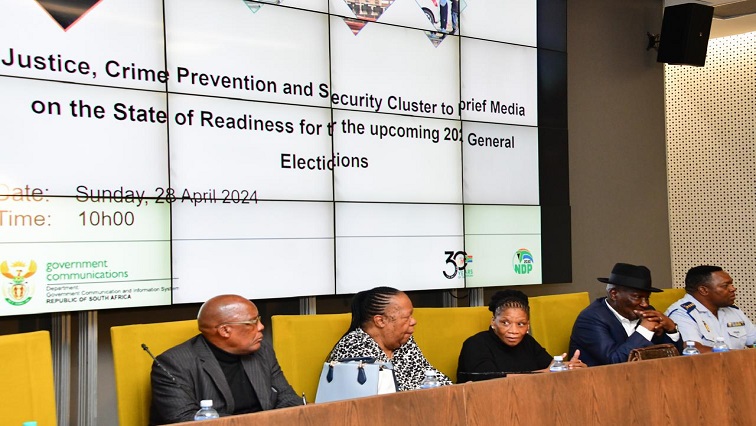Johnathan Paoli
THE Justice, Crime Prevention, and Security (JCPS) Cluster announced that government and the security cluster ministers were ready to ensure secure and peaceful elections on May 29.
In a media brief on Sunday, the Ministers of the Cluster said they wanted to assure the public of the cluster’s readiness to execute its mandate of protecting the public, and the country’s strategic infrastructure during the election period.
“We will do everything in our power to protect all those who want to exercise their constitutional right to vote,” the statement read.
The cluster said that their approach is to ensure coordinated and intelligence-led planning and operations pre-, during, and post elections where multi-departmental teams work together to ensure that all South Africans could cast their votes without fear of intimidation or violence.
The National Joint Structure (NATJOINTS) of the JCPS has recommended a fit-for-purpose deployment plan that will deal with any potential threats of crime and violence in and around voting stations and national and provincial results centres.
“NATJOINTS has done a thorough threat and crime pattern analysis to inform the development of a security plan and they want to ensure that nothing is left to chance,” JCPS said.
The ministers confirmed that the Ministry of Police and the South African Police Service (SAPS) management have conducted several oversight roadshows in all provinces and met with station commanders and district commissioners to assess the SAPS state of readiness and preparedness to ensure safety and security.
The National Disaster Management Centre (NDMC) has activated provincial disaster management teams to identify risks and put mitigation measures in place for any disasters that may occur pre, during and post the elections.
In addition, a protocol has been established between the Department of Justice and Constitutional Development, SAPS Detectives and the National Prosecuting Agency (NPA) to prioritise all election-related crimes.
The cluster further warned the public about the sharing of false information and misinformation on different platforms and said that a charge of inciting public violence would follow lawbreakers.
“As the JCPS Cluster leadership, we want to send a clear message to the public that no incitement to violence, lawlessness, destruction of infrastructure, or barricading of roads will be tolerated. Anyone who participates in any form of criminal activity will be dealt with,” the statement read.
On Friday Parliament Portfolio Committee on Home Affairs said it is confident in the processes to ensure the 2024 provincial and national elections are free and fair following its oversight visit to the Independent Electoral Commission (IEC).
The committee, as part of its oversight role over the executive, concluded its oversight visit to the Commission’s national offices on Friday, with committee Chairperson Mosa Chabane saying that everything was in place ahead of the country going to the voting stations on 29 May.
“The interactions held reaffirmed the confidence that the committee has in the IEC as a prime institution that is capable of delivering on its constitutional mandate. The processes in place, the technological advances and training undertaken already are testament to the credibility of the institution to run these elections,” Chabane said.
Parliamentary spokesperson Malatswa Molepo, speaking on behalf of Chabane, said the committee saw demonstrations of the functionality of the voter management devices and the various platforms, which would enhance the voting process, but called for the need to have backup measures and procedures in place in the event of a system breakdown or malfunction.
Molepo said that the committee stressed the need for continued training and education to ensure a seamless process, which included voter education and providing election officials with the resources, training, and support to operate the devices.
“With this election a watershed moment as independent candidates are contesting for the first time; the committee has called on all participants to adhere to the electoral code of conduct. The committee called on people to not vandalise election materials of opponents,” Molepo said.
Eskom on the other hand said it signed a memorandum of understanding (MOU) with the commission in a bid to limit the impact of load shedding during the May national elections.
Eskom has recently been accused of being manipulated by the African National Congress (ANC)-led government to keep the lights on at all costs, as political parties use the contentious issue of load shedding as an election tool to woo voters.
However, Group Executive for distribution Monde Bala said that this is standard procedure for events of national importance and denied that there is anything unusual about the agreement.
“I would imagine that the IEC has other MOUs with other major role players, like telecoms and the people that provide data. The same goes for us who provide electricity to a large part of the country, so we collaborate with them to make sure that from a planning point of view and an emergency point of view, we’ve got our ducks in a row,” Bala said.
INSIDE POLITICS



